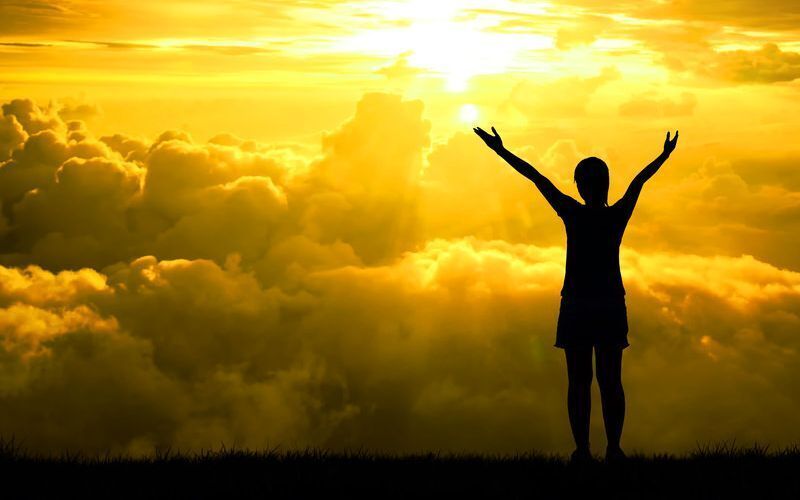Photo by Jesada Wongsa on Dreamstime
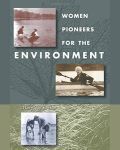
Breton, Mary Joy. Women Pioneers For The Environment. Northeastern Press, 2016.
As the torchbearers of environmental activism, women from around the world have created profound changes that are helping to ensure a healthier planet for all living things. Whether it is Judi Bari, who was crippled by a car bomb because of her efforts to save California's ancient redwood forests; Dai Qing, who was imprisoned for her opposition to an environmentally destructive dam on China's Yangtze River; or Dr. Tatynana Artyomkina, who defied KGB threats and exposed health and environmental risks in the Soviet Union, women have put their lives on the line and persevered against daunting odds to restore and protect the environment.
Mary Joy Breton provides absorbing sketches of these and other women activists in the Americas, Eastern and Western Europe, Africa, and Asia. Breton interweaves her accounts with narrative on the ecological hazards that drove these women to spearhead various environmental campaigns, examining why and how they challenged, and often defeated, the power structures of government and industry.
Although these remarkable women come from various geographical regions and represent a wide range of economic, ethnic, and political backgrounds, they share insights, values, and a particular sensitivity to the Earth that led them to change the course of history. Their courageous efforts illuminate the crucial role of women in the environmental movement, and provide inspiration for a new generation of activists.
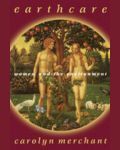
Merchant, Carolyn. Earthcare: Women and the Environment. Routledge, 1995.
Written by one of the leading thinkers in environmentalism, Earthcarebrings together Merchant's existing work on the topic of women and the environment as well as updated and new essays. Earthcare looks at age-old historical associations of women with nature, beginning with Eve and continuing through to environmental activists of today, women's commitment to environmental conservation, and the problematic assumptions of women as caregivers and men as dominating nature.
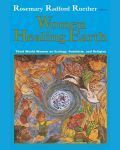
Ruether, Rosemary Radford. Women Healing Earth: Third World Women on Ecology, Feminism and Religion. Orbis Books, 1996.
In Women Healing Earth noted theologian Rosemary Radford Ruether brings together illuminating writings of fourteen Latin American, Asian, and African women on the meaning of eco-theological issues in their own contexts - and the implications they have for women in the first world. Ruether has spent the last several years exploring the environmental crisis, the roles of religion and feminists, and what third-world women have to say. Ecofeminists in the North must listen carefully to women in the South since common problems can only be solved by understanding cultural and historical differences. When women of the South reflect on ecological themes, these questions are rooted in life and death matters, not in theory, nor statistics. As Ruether writes, "Deforestation means women walking twice as far each day to gather wood .... Pollution means children in shantytowns dying of dehydration from unclean water". Impoverishment of the environment equals literal impoverishment for the vast majority of people on the planet. In addressing the intertwining issues of ecology, of class and race, of religion and its liberative elements, Women Healing Earth offers profound insights for all women and men involved in the struggles to overcome violence against women and nature, and to ensure ecological preservation and social justice.
Rosemary Radford Ruether is Professor Emerita of Theology at the Pacific School of Religion in Berkeley, California. She is the author of many books on feminism and Christianity.
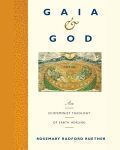
Ruether, Rosemary Radford. Gaia and God: An Ecofeminist Theology of Earth Healing. HarperOne, 1994.
Internationally acclaimed author and teacher Rosemary Radfor Ruether presents a sweeping ecofeminist theology that illuminates a parth toward "earth healing"--a whole relationship between men and women, communities and nations. This is a theology that really matters. ~Harvey Cox
This is a comprehensive and important discussion of three main myths of creation, destruction, and domination. Ruether ( Mary: The Feminine Face of the Church , Westminster/John Knox Pr., 1977) shows how these patriarchal stories still permeate the culture and social structure of the Western world today. She eloquently critiques these values from an ecological and feminist point of view, exploring how male domination of women and of nature are interconnected. Arguing that these values must be changed, she develops potential ways for healing ourselves and our planet from within existing religious traditions. This work is useful for special collections in religion, woman's studies, and ecology. It assumes some relevant knowledge on the part of the reader but is highly relevant for this specialized audience. ~Marilyn E. Schafer, Canadian Memorial Chiropractic College, Toronto (for Library Journal)
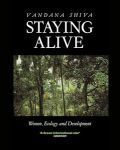
Shiva, Vandana. Staying Alive, Women, Ecology and Development. North Atlantic Books 2016.
Inspired by women’s struggles for the protection of nature as a condition for human survival, award-winning environmentalist Vandana Shiva shows how ecological destruction and the marginalization of women are not inevitable, economically or scientifically. She argues that “maldevelopment”—the violation of the integrity of organic, interconnected, and interdependent systems that sets in motion a process of exploitation, inequality, and injustice—is dragging the world down a path of self-destruction, threatening survival itself. Shiva articulates how rural Indian women experience and perceive ecological destruction and its causes, and how they have conceived and initiated processes to arrest the destruction of nature and begin its regeneration. Focusing on science and development as patriarchal projects, Staying Alive is a powerfully relevant book that positions women not solely as survivors of the crisis, but as the source of crucial insights and visions to guide our struggle.
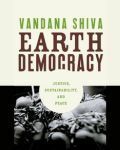
Shiva, Vandana. Earth Democracy: Justice, Sustainability and Peace. North Atlantic Books, 2015.
World-renowned environmental activist and physicist Vandana Shiva calls for a radical shift in the values that govern democracies, condemning the role that unrestricted capitalism has played in the destruction of environments and livelihoods. She explores the issues she helped bring to international attention—genetic food engineering, culture theft, and natural resource privatization—uncovering their links to the rising tide of fundamentalism, violence against women, and planetary death. Struggles on the streets of Seattle and Cancun and in homes and farms across the world have yielded a set of principles based on inclusion, nonviolence, reclaiming the commons, and freely sharing the earth’s resources. These ideals, which Dr. Shiva calls “Earth Democracy,” serve as an urgent call to peace and as the basis for a just and sustainable future.
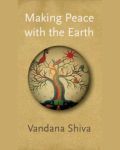
Shiva, Vandana. Making Peace with the Earth. Pluto Press, 2013.
In this compelling and rigorously documented exposition, Vandana Shiva demolishes the myths propagated by corporate globalisation in its pursuit of profit and power and shows its devastating environmental impact.
Shiva argues that consumerism lubricates the war against the earth and that corporate control violates all ethical and ecological limits. She takes the reader on a journey through the world's devastated eco-landscape, one of genetic engineering, industrial development and land-grabs in Africa, Asia and South America. She concludes that exploitation of this order is incurring an ecological and economic debt that is unsustainable.
Making Peace with the Earth outlines how a paradigm shift to earth-centred politics and economics is our only chance of survival and how collective resistance to corporate exploitation can open the way to a new environmentalism.
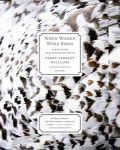
Williams, Terry Tempest. When Women Were Birds: Fifty-Four Variations on Voice. Picador, 2013
"Brilliant, meditative, and full of surprises, wisdom, and wonder."―Ann Lamott, author of Imperfect Birds
"I am leaving you all my journals, but you must promise me you won't look at them until after I'm gone." This is what Terry Tempest Williams's mother, the matriarch of a large Mormon clan in northern Utah, told her a week before she died. It was a shock to Williams to discover that her mother had kept journals. But not as much of a shock as it was to discover that the three shelves of journals were all blank. In fifty-four short chapters, Williams recounts memories of her mother, ponders her own faith, and contemplates the notion of absence and presence art and in our world. When Women Were Birds is a carefully crafted kaleidoscope that keeps turning around the question: What does it mean to have a voice?
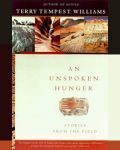
Williams, Terry Tempest. An Unspoken Hunger: Stories from the Field. Vintage, 1995.
Terry Tempest Williams makes it clear that we lose an essential part of ourselves when we neglect the earth, but this collection of essays does not offer a soapbox delivery of tired manifestoes; rather, it uses poetic and insightful inspiration to urge the reader to become aware, assess the damage, and begin to heal broken bonds. In her essay "Yellowstone: The Erotics of Place," Williams writes, "There is no defense against an open heart and a supple body in dialogue with wildness. Internal strength is an absorption of the external landscape. We are informed by beauty, raw and sensual. Through an erotics of place our sensitivity becomes our sensibility."
A native of Utah, Williams is best known for her reflections on the American West, but the first essay in this book takes us to Africa's Serengeti Plain: "Morning comes quickly near the equator. There is little delineation of dawn. On the Serengeti, it is either day or night. A peculiar lull occurs just before sunrise. The world is cool and still. Gradually, the sun climbs the ladder of clouds until the sky mirrors the nacreous hues of abalone."
Through these readings you'll discover that Williams's "unspoken hunger" is for us to live lives with greater intent and accountability and in greater intimacy with the natural world. --Kathryn True (Amazon.com)
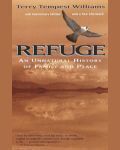
Williams, Terry Tempest. Refuge: An Unnatural History of Family and Place. Vintage; Reprint, 1992.
In the spring of 1983 Terry Tempest Williams learned that her mother was dying of cancer. That same season, The Great Salt Lake began to rise to record heights, threatening the herons, owls, and snowy egrets that Williams, a poet and naturalist, had come to gauge her life by. One event was nature at its most random, the other a by-product of rogue technology: Terry's mother, and Terry herself, had been exposed to the fallout of atomic bomb tests in the 1950s. As it interweaves these narratives of dying and accommodation, Refuge transforms tragedy into a document of renewal and spiritual grace, resulting in a work that has become a classic.

